 |
|||||
|
|||||
| Preview of Stamps Catalogue: VOLUME 1 |
 |
|||||
|
|||||
| Preview of Stamps Catalogue: VOLUME 1 |
Return To Catalogue - 1891-1920 issues and miscellaneous - Fiji Times Express
Note: on my website many of the
pictures can not be seen! They are of course present in the catalogue;
contact me if you want to purchase it.
The first stamps that were issued in Fiji are the Fiji Times Express stamps.
The stamps of Fiji from 1871 to 1880 are merely cancelled with penstrokes.
1 p blue 3 p green 6 p red
These stamps have perforation 12 1/2 and a sheet-watermark 'FIJI POSTAGE'. Imperforate stamps were specially sold to stamp dealers (never used for postage).
Value of the stamps |
|||
vc = very common c = common * = not so common ** = uncommon |
*** = very uncommon R = rare RR = very rare RRR = extremely rare |
||
| Value | Unused | Used | Remarks |
| 1 p | *** | *** | |
| 3 p | *** | *** | |
| 6 p | *** | *** | |
Surcharged in Cents
'Two Cents.' on 1 p blue 'Six Cents.' on 3 p green 'Twelve Cents.' on 6 p red
Imperforate stamps are proofs (***).
Value of the stamps |
|||
vc = very common c = common * = not so common ** = uncommon |
*** = very uncommon R = rare RR = very rare RRR = extremely rare |
||
| Value | Unused | Used | Remarks |
| 1 p | *** | *** | |
| 3 p | *** | *** | |
| 6 p | *** | *** | |
Surcharged "V.R." in normal letters
'V.R.' on 'Two Cents.' on 1 p blue 'V.R.' on 'Six Cents.' on 3 p green 'V.R.' on 'Twelve Cents.' on 6 p red 'V.R. 2d.' on 'Six Cents.' on 3 p green '2d.' (red) on 'V.R.' on 'Six Cents.' on 3 p green 'V.R. 2d.' on 'Twelve Cents.' on 6 p red
Value of the stamps |
|||
vc = very common c = common * = not so common ** = uncommon |
*** = very uncommon R = rare RR = very rare RRR = extremely rare |
||
| Value | Unused | Used | Remarks |
| Two types of 'VR'
overprint for each value, type 1: 'VR' normal, type 2: 'V' with horizontal bar in middle (gothic) |
|||
| 2 c on 1 p | RR | R | Both types |
| 6 c on 3 p | RRR | RR | Both types |
| 12 c on 6 p | RR | R | Both types |
| 2 p on 2 c on 1 p | RR | RR | Both types |
| 2 p (red) on 6 c on 1 p | RR | R | Both types |
| 2 p on 12 c on 6 p | RRR | RR | Both types |
Other fancy 'VR' overprint

1 p blue 'Two Pence' on 3 p green 'Four Pence' on 3 p lilac 6 p lilac
These stamps have no watermark. Imperforated stamps exist.
Value of the stamps |
|||
vc = very common c = common * = not so common ** = uncommon |
*** = very uncommon R = rare RR = very rare RRR = extremely rare |
||
| Value | Unused | Used | Remarks |
| 1 p | *** | *** | |
| 2 p on 3 p | *** | *** | Exists without 'Two Pence' surcharge: *** |
| 4 p on 3 p | *** | ** | |
| 6 p | *** | *** | |
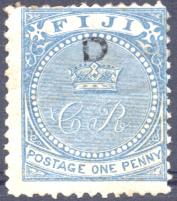

Stamps with overprint 'D' (large or small as shown above) are fiscal stamps.
A nice website on forgeries of these stamps can be found at: https://www.pisc.org.uk/fijiforgeries.html It seems that Spiro, Mercier and an unknown forger have made forgeries of the basic stamps.
 \
\
Spiro made some forgeries of these stamps. Spiro forgeries are the most common of all forgeries of these stamps. The 3 p and 6 p value have pearls in the circle as in the design of the 1 p. But the genuine stamps don't have pearls in the design (except for the 1 p), but white and green dots in the 3 p and a zig-zag line in the 6 p. In the genuine stamps the dark space below the base of the crown is almost flat, in the above forgeries it is very curved. The forgery of the 1 p can also be distinguished by the normal "Y" in "PENNY", in the genuine stamps the "Y" is very wide. Often, guidenlines can be seen near the perforations in the Spiro forgeries.
![]()

(Genuine)
![]()
(Forged 3 p 'pearls', should be 'dots')


The above stamps are also Spiro forgeries, the cancel with three circles and lines in the center was never used in Fiji. The next stamps also have the same cancel . There are pearls in the 3 p and 6 p values (see the remark about Spiro forgeries above):
Spiro forgeries even exist imperforate:
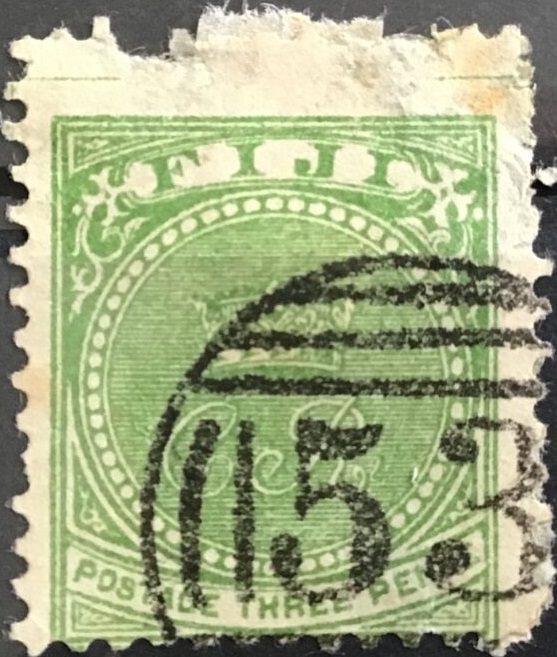

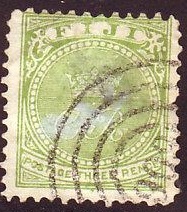
Spiro(?) forgeries with a "53"
cancel, a circle with parallel bars and a "909" cancel. These cancels
exist on forgeries of many other countries as well.
I've been told these are Mercier forgeries, but I
think they are probably made by the forger Oneglia.
Oneglia offered these forgeries for the first time in his 1906
catalogue. All three unsurcharged stamps were forged.
In his 1 p forgery, there are too many pearls (65 instead of 55),
and the base of the crown is rounded instead of being flat. The 1
p forgery also exists imperforate (without cancel).
In his 3 p forgery, the correct pattern for the circle is used,
but the base of the crown is rounded instead of being flat (I've
also seen the 3 p forgery without any overprint).
In his 6 p forgery there are pearls in the circle instead of the
zig-zag pattern of the genuine stamps (similar to the Spiro
forgeries, the Spiro forgeries have 55 pearls, Mercier's
forgeries have 56 pearls). I've also seen the 6 p forgery with a
'VR' overprint only.
Although I'm not entirely sure, it looks like these forgeries
have the typical bars with "G" cancel as can be found
on many other Oneglia forgeries.
In the next forgery of the 6 p, the words "FIJI" and "POSTAGE SIX PENCE" are in red on a white background (like the genuine 1 p and 3 p). However, the genuine stamps have these words in white on a red background!
The next 1 p and 3 p forgeries have a rounded bottom of the crown and are printed quite blurly. The 6 p forgery has the ornaments in the circle too pronounced.



Images obtained from https://www.pisc.org.uk/fijiforgeries.html
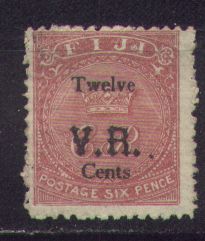
A genuine (?) stamp with forged overprint.

A forged 'VR' overprint made by Fournier,
the image was taken from a 'Fournier Album of Philatelic
Forgeries'.
1/2 p grey 1 p blue 2 p green 2 1/2 p brown 4 p lilac 6 p red
These stamps sometimes show parts of a sheet-watermark.
Value of the stamps |
|||
vc = very common c = common * = not so common ** = uncommon |
*** = very uncommon R = rare RR = very rare RRR = extremely rare |
||
| Value | Unused | Used | Remarks |
| 1/2 p | * | * | Issued 1892, several perforations |
| 1 p | * | * | Various perforations, imperforate stamps also exist |
| 2 p | ** | ** | Various perforations |
| 2 1/2 p | * | * | Issued 1892, several perforations, cancelled to order: c |
| 4 p | * | * | Issued 1892, several perforations, exists cancelled to order: * |
| 6 p | *** | ** | Various perforations, cancelled to order: * |
Surcharged
'1/2 d.' on 1 p blue 'Two Pence' on 3 p green '2 1/2 d.' on 2 p green 'Four Pence' on 1 p lilac '5 d' on 4 p lilac 'FIVE PENCE' on 6 p red
Value of the stamps |
|||
vc = very common c = common * = not so common ** = uncommon |
*** = very uncommon R = rare RR = very rare RRR = extremely rare |
||
| Value | Unused | Used | Remarks |
| 1/2 p on 1 p | *** | *** | Perforated 10 |
| 2 p on 3 p | ** | ** | Perforated 12 1/2 |
| 2 1/2 p on 2 p | ** | ** | Perforated 10, two types, distance between '2' and '1/2' 1 mm or 2 mm (***) |
| 4 p on 1 p | *** | ** | Perforated 10 |
| 5 p on 4 p | *** | *** | Perforated 10, issued 1892 |
| 5 p on 6 p | *** | *** | Perforated 10, issued 1892, two types 'FIVE' and 'PENCE' 3 mm or 2 mm apart |
Typical cancel 'sunburst':

I've also seen this cancel on KEVII and KGV stamps.

This is supposed to be a rare double printed 2 1/2 p stamp.
However, it has the same "SUVA 15 DEC 00" which was
applied specially for stamp collectors on stamps of the next
issue.....

Mystery item: 1 p yellow, imperforate with large margins and
small cancel consisting of parallel lines.
1 Sh brown 5 Sh black and red
These stamps sometimes show part of a sheet-watermark. Several perforations were used.
Value of the stamps |
|||
vc = very common c = common * = not so common ** = uncommon |
*** = very uncommon R = rare RR = very rare RRR = extremely rare |
||
| Value | Unused | Used | Remarks |
| 1 Sh | ** | ** | Cancelled to order: ** |
| 5 Sh | *** | *** | Cancelled to order: ** |
Forgeries, examples:

Bottom part of a forgery with the word "FALSCH" written
in red at the bottom, right through the imaginary perforation.
The above forgery is a primitive forgery of the 5 Sh stamp made by Senf, note the very strange form of the chin of the Queen. The perforation was actually printed originally by Senf, but has been carefully cut out by someone in the above forgery. This also eliminates most of the word "FALSCH" (=forgery in German), which was printed at the bottom of the stamp (through the perforation) in red colour. This forgery is also described in the book 'Album Weeds'.
Fournier has made forgeries of the 1 Sh stamp. He offers it in its '1914 Price-list of philatelic forgeries' as a first choice stamp for 1 Swiss frank. The following partly perforated sheet comes from a Fournier album (after he died albums with his forgeries were made to warn collectors against his forgeries) and I think the above stamp might also come from such an album (of course Fournier offered his stamps perforated). I've seen the forgeries perforated 11 1/2 and 12 1/2. They often bear the cancellation "NAUSORIPOR 5 MAR 1902 FIJI". The Fournier forgeries are quite deceptive, but they have the white area in the neck slightly different.
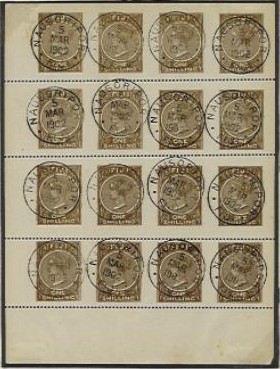

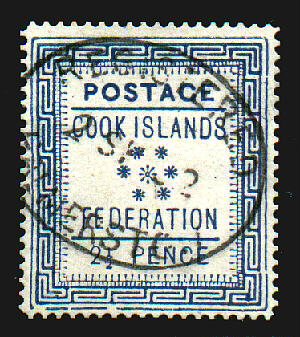
Here a Fournier forgery with a "REGISTERED 2 SP 92
PALMERSTON" cancel which also can be found on forgeries of
Cook Islands.

A different forgery of the 1 Sh value, the lines forming the
central circle are not very well done. The face of the Queen
appears different.
The government of Fiji also made stamps for stamp collectors by applying a cancel to them. The cancels used were a circle with "SUVA 15 DEC 00" and "SUVA DE 9 19 01". The stamps below are such cancels, it has also been applied to other stamps: the 2 1/2 p VR issue, the 4 p VR issue, 6 p VR issue, the 1 Sh, the 5 Sh, a non-issued 5 Sh grey and orange-red (new plate, issued in 1922) and the 1 p lilac and 5 p of the canoe issue. Examples:



For 1891-1920 issues and miscellaneous stamps of Fiji click here.
Stamps - Timbres-Poste - Briefmarken